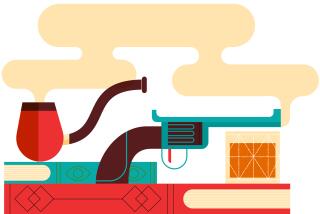A simple tale, simply told
- Share via
Tony Earley’s first novel, “Jim the Boy,” had all the simplicity of its plain-spoken title. The story follows a year in the uneventful life of a 10-year-old in an idyllic North Carolina town during the Great Depression. There’s nothing ironic or postmodern about the style or plot. Some found it an old-fashioned, charming fable; to others, the novel provoked eye-rolling and was dismissed as cloying and moralistic.
The author’s latest, “The Blue Star,” shouldn’t change anyone’s mind either way. It’s as earnest as ever, and like its predecessor (Earley has also penned a volume of stories and a quasi-memoir) features a retro-looking watercolor illustration on the cover. (You might easily mistake it for a children’s book.)
Earley applies the same narrative formula to the sequel, but both tales are self-contained enough that it isn’t necessary to have read the debut to enjoy its follow-up. Here too are lovely descriptive sentences in Earley’s typically unfussy style: “She was tall and stooped and thin as a broom handle,” he writes of a schoolteacher.
And the closest he gets to allowing his characters a profane utterance is “daggum it.”
Seven years have passed in the story’s chronology. High school senior Jim Glass is still living with his widowed mother and his three uncles, Zeno, Coran and Al.
It’s the summer of 1941 and Jim is coping with his first agonizing, delirious bout of teenage love. The world at large is on the brink of war and decidedly more complex than he’s used to, and his own immediate world has become more challenging -- the girl he’s infatuated with, Chrissie Steppe, has a boyfriend.
There are other complications. Chrissie is half-Cherokee; her estranged father is a gossiped-about criminal; her family is poor; worst of all, her boyfriend, Bucky Bucklaw, is an arrogant, controlling rich kid who considers Chrissie more possession than girlfriend.
Bucky is in the Navy and has gone overseas, but that doesn’t get Chrissie off the hook. She lives with her mother and grandparents on the Bucklaws’ property, essentially working as servants for their landlords.
Chrissie feels ashamed as she tells Jim that she sleeps in the kitchen on a mattress made of corn shucks. But how she feels about anything is irrelevant, she explains; her sad fate is to marry Bucky, whether she likes it or not. Aside from this, Norma Harris, Jim’s former girlfriend (whom he broke up with the previous summer) still holds out hope that they’ll get back together.
None of this stops Jim from following his heart and charging ahead. (“Being in love is like getting run over,” his Uncle Zeno tells him. “Sometimes it kills you and sometimes it don’t.”) Of course, the passion of youth has never been marked by moderation or logic.
When Jim sits behind Chrissie in history class, “the colors of the spectrum flared in Chrissie’s hair with the hopeful radiance of undiscovered stars. Jim sat very still and held his breath, aware that he had entered into a magical place where it would not be possible to stay.”
Plot wise, this is the narrative equivalent of ambling along a country road. Earley keeps things simple, and that means that issues such as teen pregnancy, racism, class and Pearl Harbor are explored slightly but not fully dealt with. You take in what you see and savor it without giving it much thought.
Jim’s development is based on internal revelations more than dramatic encounters with others. He’s a thoughtful young man with a spirit as gentle as Bucky’s is brash and macho.
By the end of the novel, Jim acquires maturity and an acceptance of what he can’t control -- hard-won wisdom that he finds bittersweet.
Nothing terribly shocking happens (though there is one twist), and it’s easy to assume that a third installment of Jim’s story is yet to come.
It’s true that “The Blue Star” comes perilously close to sentimentality in certain moments and in others indulges in it full on. Still, there’s an appealing sweetness to this story.
Those who like their fiction too smart alecky for its own good may bristle at Earley’s latest work, but those with irony fatigue and a tolerance for earnest, straightforward prose will find much to appreciate.
--
Carmela Ciuraru is the editor of six anthologies of poetry, including “Beat Poets.”
More to Read
Sign up for our Book Club newsletter
Get the latest news, events and more from the Los Angeles Times Book Club, and help us get L.A. reading and talking.
You may occasionally receive promotional content from the Los Angeles Times.







